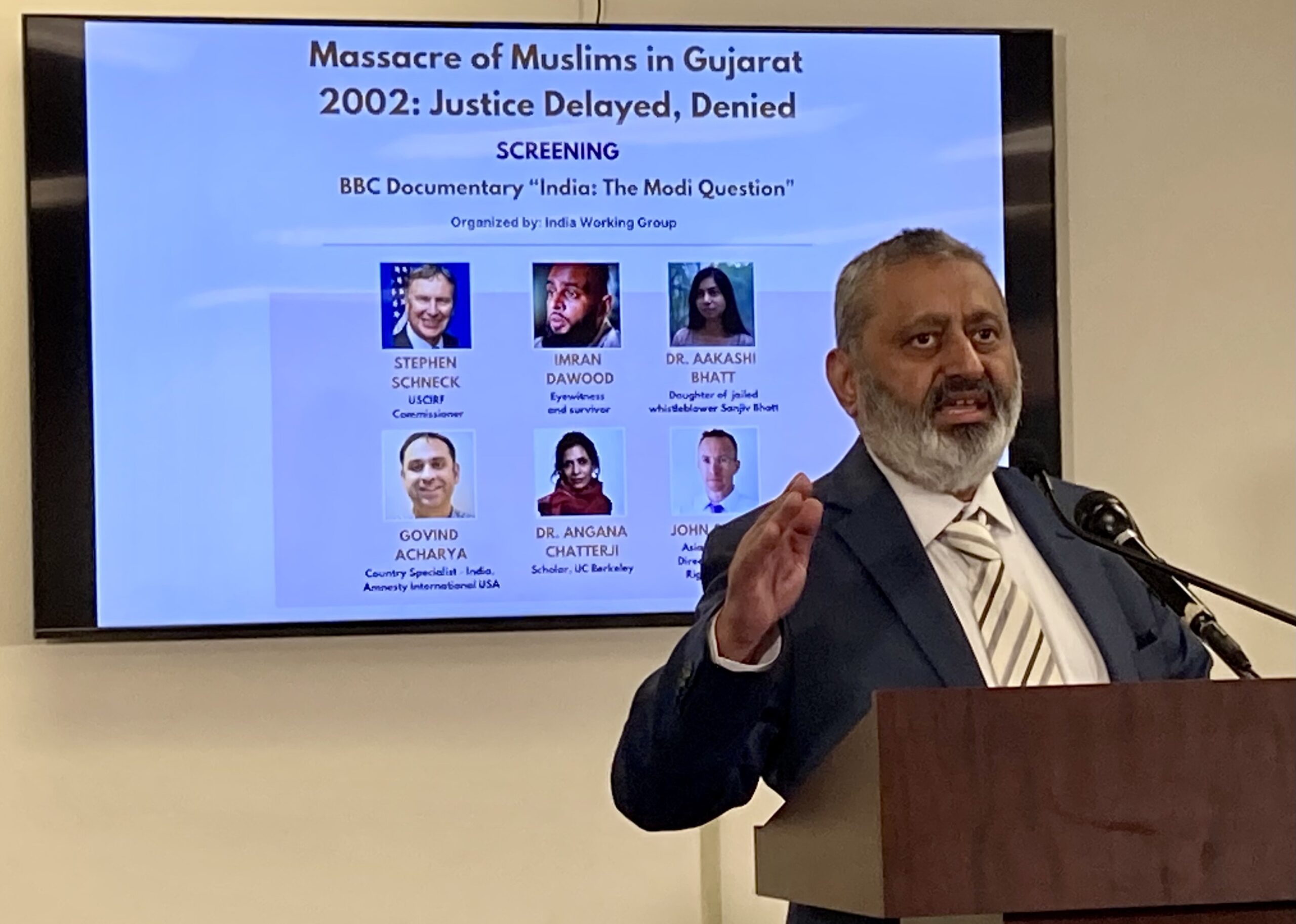Washington, D.C.: International Society for Peace & Justice and co-chair of the India Working Group, president Dr. Rehan Khan called on the United States government to officially declare Gujarat 2002 pogrom as genocide.
“This is the 21st anniversary of the Gujarat mass murder,” Khan said. “Why are we talking about this 21 years later? Because the cycle of violence has not stopped yet. Hindu right-wing groups are terrorizing minorities.”
“We also call on the US government to designate Vishwa Hindu Parishad and Bajrang Dal as terrorist organizations,” Dr. Khan added.
Human rights, and faith leaders, as well as survivors, met on Capitol Hill on Tuesday to mark the 21st anniversary of an episode of anti-Muslim mass violence that continues to reverberate in the global Indian diaspora two decades later – the killing of thousands of Muslims throughout the state of Gujarat, India by right-wing Hindu extremists.
Pogrom eyewitness and survivor Imran Dawood shared his powerful testimony in the BBC documentary and with congress members. “My human dignity was taken away from me in Gujarat. I was forced to disrobe and show that Hindu mobs circumcised me. It was like in Nazi Germany. This should never happen again,” he said.
While serving as chief minister of Gujarat state, Modi ordered police to stand down and “allow Hindus to vent their anger” as violent Hindu-supremacist mobs slaughtered more than 2,000 predominantly Muslim Indians, destroyed more than 350 Mosques, and razed 20,000 Muslim-owned properties. Rioters beat Dawood and left him for dead before killing his two uncles as well as their family friend.
“The trauma will always be with me but I won’t be defined by it. We must oppose the BJP’s hateful bulldozer policies,” Dawood said, referencing the BJP’s ongoing and extensive use of bulldozers to destroy Muslim-owned properties.
Aakashi Bhatt, daughter of jailed whistleblower and former senior police officer Sanjiv Bhatt, discussed her father’s attempts to expose Modi’s role in the pogrom. Sanjiv had met with Modi during the three days of violence that rocked Gujarat and later testified to the Indian Supreme Court that Modi had ordered police to let violent mobs kill Muslims. Sanjiv Bhatt was fired from his post shortly after Modi was elected Prime Minister in 2014 and sentenced to life imprisonment in 2019 on bogus charges.
“My father was framed and incarcerated for a crime he did not commit. His only crime was holding Modi and Amit Shah [Modi’s close political advisor] accountable for their heinous crimes,” Bhatt said of her father.
“Anyone who still thinks India is a democracy, they are in deception. A country that does not allow people to exercise their own religion, thoughts, or speech, where one tweet can mean prison time, where your choice of food or spouse can result in you being lynched in broad daylight, where every media outlet is controlled by the regime — this is not a democracy. This is a dictatorship,” she added.
Another panelist, Commissioner Stephen Schneck of the U.S. Commission on International Religious Freedom, called out the many human rights violations happening under the Modi government and urged the U.S. government to designate India as a “country of particular concern.” The Commission has recommended for the past three years that the State Department designate India as a CPC, but the agency has yet to do so.
Schneck noted that the Modi government’s policies have “created a culture of impunity for national campaigns of violence against Muslims and Christians.”
“The U.S. must designate India a country of particular concern,” he continued. “We at USCIRF continue to press President Biden and Congress to do so.”
Panelist Govind Acharya, India specialist with Amnesty International, discussed current human rights abuses against Indian Christians and Muslims, tying them in with the Gujarat pogrom.
“There’s the injustice of Gujarat, and the decades of impunity that stemmed from the impunity of Gujarat,” he said.
“The pogroms left deep scars on Indian American consciences,” IAMC Associate Director Amin Zama said. “We call on Congress to push for a transparent and impartial investigation into the Gujarat pogrom and to prosecute those responsible for the crimes.”
The briefing, which included a panel discussion and a showing of excerpts from the BBC documentary “India: The Modi Question,” took place in a meeting room at the Ford House Office Building. The event was organized by the India Working Group, part of the Washington, D.C.-based International Religious Freedom Roundtable. Members of the IWG include human rights groups such as the International Society for Peace and Justice, the Indian American Muslim Council, Justice for All, Hindus for Human Rights, and others.









